Future-making on Hold
Pandemic Audio Diaries from two Rift Valley Lakes in Kenya
In this post, we share the accounts of our research partners from Lake Baringo and Lake Naivasha in the Kenyan Rift Valley on how the SARS-CoV-2 pandemic impacts their lives and livelihoods. In mobile research with mobile people, mobile media have for long taken an important stance in terms of communicating in and with “the field“- blurring the lines of where the field begins and where it ends. In these times of a pandemic, scholars and friends, family members and business partners alike increasingly resort to digital means of communication in order to keep in touch, send remittances, and attempt to continue their social lives. As in most parts of the world, the current pandemic and its political and social consequences have catapulted our interlocutors in Kenya into an extreme situation – both financially and socially – to make ends meet, let alone to pursue their established strategies of making do and making futures. We have collected the accounts of our interlocutors, who reported on their situation via WhatsApp voice messages: First shortly after the nationwide curfew was imposed on 25 March, showing how the radical restrictions on the mobility of people and goods, as well as on business hours, schools and other facilities, changed their lives drastically and abruptly only 12 days after the first case was confirmed in Kenya. In May, after local lockdowns and further governmental measures to prevent the outbreak were installed and are kept in place, some of them have sent us a second message in which we learned of the actions they have taken to cope with or adapt to the situation, and the struggles that came with it.
The accounts we are sharing here not only give insight into the current situation that our field contacts and research assistants are facing, but also into their ways of making sense of the measures that have been or should be taken, and the role they ascribe to institutions and organizations in this process. With this in mind, we wish to reflect and trigger a debate on our responsibilities as researchers in countries of the “Global South”, in light of stalled arrangements with our research assistants, and the people we work with for the topics we research.
Concerns in the Field
In mid-March, we decided to fly back to Germany from Kenya together after a period of joint fieldwork. Our research concerns the strategies of Luo migrants from western Kenya (former Nyanza province, along the shores of Lake Victoria) into the Rift Valley, precisely Lakes Naivasha and Baringo, where they engage in fishing activities, tourism and wage labor in horticultural and cut-flower farms. We were at Lake Naivasha, amidst the dense settlements of flower farm workers, when we took the decision to interrupt our fieldwork plans due to the current SARS-CoV-2 outbreak in Europe. We had planned to visit Lake Victoria to meet some fishermen in their nineties who had migrated to Lake Baringo in their younger days and whom we wanted to interview for an oral history of fishing at Lake Baringo. We had also planned to go to Baringo itself to conduct fieldwork there and pick up our research assistant, a descendant of one of the fishermen who had already passed away a few years back. Our decision was quite abrupt, and came much to the surprise of some of our colleagues. It was mainly based on two concerns: 1) As we were traveling across the country and various settings, we were afraid to be transporting the virus unknowingly with us, and to some potentially vulnerable communities. And we were equally afraid of being perceived and accused to do so, even in the likely case we weren’t infected. 2) As our multi-sited fieldwork depended on these kinds of mobilities, it no longer seemed reasonable to continue given that it appeared only a matter of time before restrictions as well as the virus itself would hit Kenya (at the moment of decision, there were only two reported cases in Kenya, but also the only two testing facilities had just opened a day earlier). In these “epidemic times“, the temporality of risk perception varies from day to day. On the day we left Kenya (15 March 2020) our decision still seemed quite radical, but on the way to the airport later that day, Kenya’s president Uhuru Kenyatta announced the suspension of travel from coronavirus affected nations to Nairobi within 48 hours in his address to the nation. Effectively, international flights were fully grounded on 25 March. Three days later, back in Germany, it seemed impossible to have decided otherwise. As the number of reported cases increased, risk and the perception thereof did too. And as more and more countries started to close their borders, many of our colleagues decided to leave as well.
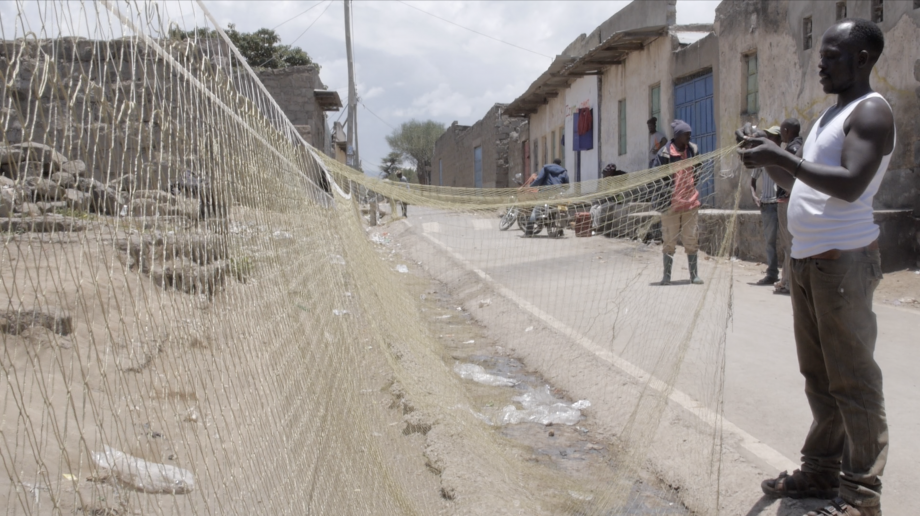
Fisherman knitting a fishing net at Karagita, Naivasha, 15 March 2020. © Anna Lisa Ramella
Leaving Fieldwork
On our last fieldwork day, we were filming a fisherman knitting a fishing net at Karagita, Lake Naivasha. He had asked us as we approached him whether we were carrying the virus. This was not the first confrontation with such a suspicion, as some people had already shouted „corona, corona“ before when we walked by. Anna responded that she had already entered Kenya some weeks ago, before the outbreak in Germany, but of course, we both knew this was no guarantee for anything, and we had actually very similar concerns. As Anna was filming the fisherman knitting, a man passed by and said: „Does she have corona?“ The knitter responded: „No, she has been here for a year, so it is impossible that she carries the virus“. While Anna had not lied about the time spent in Kenya (some weeks, not one year), this man she had met minutes ago obviously felt the need to do so. This created a strange way of complicity that made us feel highly uncomfortable. It revealed both the dilemma of responsible behavior in public and the problematic conditions of ethically responsible field research in a situation characterized by uncertainty. While it seems hardly possible to turn the general question of „spreading the virus“ into an ethical one (as if one is in a situation of full individual control), the spread of a potentially deadly virus through transnationally mobile and health-insured anthropologists in communities that lack the most basic health infrastructures seems to be one. There is a long, violent history of anthropologists carrying viruses to communities, of course, and it felt awkward and frightening to potentially find ourselves in this position. While some of our friends and colleagues tried to re-assure us that the spreading of the virus takes place with as much as without anthropologists, we had the feeling that our interlocutors were well aware that it travelled, at least back then, mainly with transnationally mobile persons, who had not only the money to move between places, but also jobs, health insurances and potential access to care that did not put them and their families at risk in equal ways. One of our interlocutors told us the next day, „we have been praying all morning that corona does not reach us“.
We have been taught and now teach our students to not put our interlocutors at risk under any circumstance. Were we really in the position to guarantee this, given that the spread of the virus had been, and to some extent still is, somewhat unpredictable even to virologists?
‘Writing Corona’
We have been hesitant to write about this issue as we felt uncomfortable exploiting the crisis for our academic productivity. Additionally, having left Kenya early on in the pandemic, we felt like we did not have much to say about the situation there. However, it did make us consider what it is we can contribute to the dealing with this current global situation. By giving accounts from the people we work with, we wish to open up possibilities for discussion, and share perspectives from other parts of the world beyond our university walls.
When some of our research participants started texting us about the immediate effects of the pandemic on their livelihoods, we realized that the issues our project is designed to enquire are actually notably amplified by the current crisis, and our research participants are drastically changing their lives, perhaps ironically so in a situation of enforced closure by an increased level of mobility: among them our host in Baringo, recounting that all six employees had to leave because of the lack of customers, a fish trader texting about the lack of business due to the closed markets in Nairobi, and farm workers in Naivasha getting laid off due to the decreasing flower industry in Europe. We had just come back from a series of interviews with former employees of a flower farm in Naivasha that financially collapsed in 2015 – now we are encountering a wave of lay-offs to an extent unimaginable until a few weeks ago. We were inquiring about the ways of living of people formerly engaged in the tourism sector at Lake Baringo, which has decreased to a minimum due to a swelling of the lake and several other factors since 2012 – now all hotels are closed, and the businesses people used to rely on as alternatives, such as fishing and fish trade, are being shut down as well. To put it bluntly, we are witnessing an intensified economic disaster for many, especially in our research regions, as we speak (see an interview with Hansjörg Dilger in which he calls Corona a „mirror of globalization“).
Concerns from the Field
As the news from Baringo and Naivasha about the drastic changes our research partners are facing kept trickling into our inbox, we asked our interlocutors to send us voice messages about their current situation in their location, as well as the effects of the pandemic on their work and life contexts, in the form of audio diaries. AllegraLab has recently launched a similar format of audio diaries from researchers around the world, which however depicts the point of view of the researchers. We want to use this method as a way of channeling voices from the field into our academic network, in order to distribute their diverse perspectives and concerns on the current crisis and its effects on livelihoods from our field-sites. In order to document changes and adaptation over time, some of them have sent us a second message about one month after the first account.
Without wanting to warm up discussions on direct speech as a way to downplay hierarchies of power in Western discourse, as have been held in e.g. Visual Anthropology for decades (in discussions raised by Young and others in Hockings’ Volume on the Principles of Visual Anthropology, or Ruby in his book on Picturing Culture, to name but few examples), we see this as a contribution through which voices from our research partners and their unique experiences in this current pandemic can find their way into our academic discussions. In their accounts, they show the effects of such a crisis in various locations of the world, as this blog suggests. The original voice messages can be heard below, some of them slightly shortened.
We understand these messages as snapshots of a moment in time, documenting life as it unfolds under the circumstances of a violent interruption of already fragile conditions. The messages show and suggest that life before and after the (partial) shutdown will be radically different for an unknown span of time, which is transferable to our research cooperations as well.
Continuing pandemic cooperation?
Our encounters in Kenya cannot be separated from the relations of cooperation researchers have been in and are engaging with all over the planet. Having entered the field as relative newcomers to Kenya, we found profoundly knowledgeable research assistants that have established themselves as mediators to a large number of colleagues from all over the world, studying various issues in a variety of disciplines in the Kenyan Rift Valley. Because it is important that these cooperations continue, we understand this post as part of an inventory of an ongoing project.
This also means to reflect on our role as cooperation partners: In the context we are researching (and criticizing), wage labor often takes place under precarious conditions, for example in flower farms where contracts are temporary and workers are forced to take unpaid voluntary leaves in times of economic shutdown such as this current one. How can we ensure we are not participating in jeopardizing already unsteady incomes of vulnerable people if we let our cooperations run dry? What does our interruption of the fieldwork mean for our partners in the field, where our research assistants are engaging in a sort of gig economy of researchers and tourists moving in and out of Kenya? When criticizing wage labor employers for their stalled payments and lay-offs, must we not also think about our own role in granting a stable income, such that had already been promised?
With this post, we wish to trigger reflections on stalled cooperation projects and our responsibilities as researchers to ensure continuity to our partners.
Note: We are aware of the gender bias in this representation. This is partly due to the gender proportions in the contexts we are researching (fishing, agricultural wage-labor) at the time of our fieldwork, as well as to an unequal distribution of the availability of smartphones in the case of our research partners, which we have tried to circumvent by collecting messages through our research assistants.
Voices from the field
Wilson Tiren, research assistant and tour guide at Kampi Ya Samaki, Lake Baringo
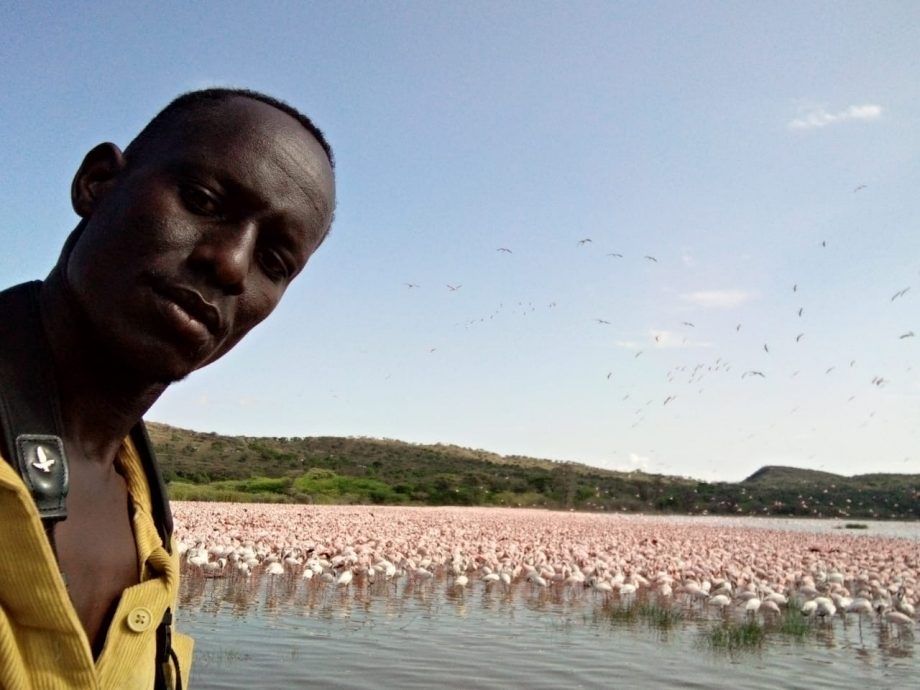
Wilson Tiren at Lake Bogoria in 2019. © Wilson Tiren
First message from Wilson: 2 April 2020
In his first message, Wilson describes how the measures taken to prevent a spreading of the virus have forced him and his community to drastically change their lifestyle in terms of abstaining from social interactions, which has caused him emotional and financial difficulties due to the nature of his job. He fears that the tourism industry will completely collapse and might not recover at all.
Second message from Wilson: 2 May 2020
A month later, Wilson reports to have accepted the current measures with all its challenges. He engaged in some small-scale farming to manage his future, as he says. Even though he still struggles with not seeing his friends and being jobless, he considers the measures important for the community as a whole.
Joginder Bashir, hotel employee at Lake Baringo
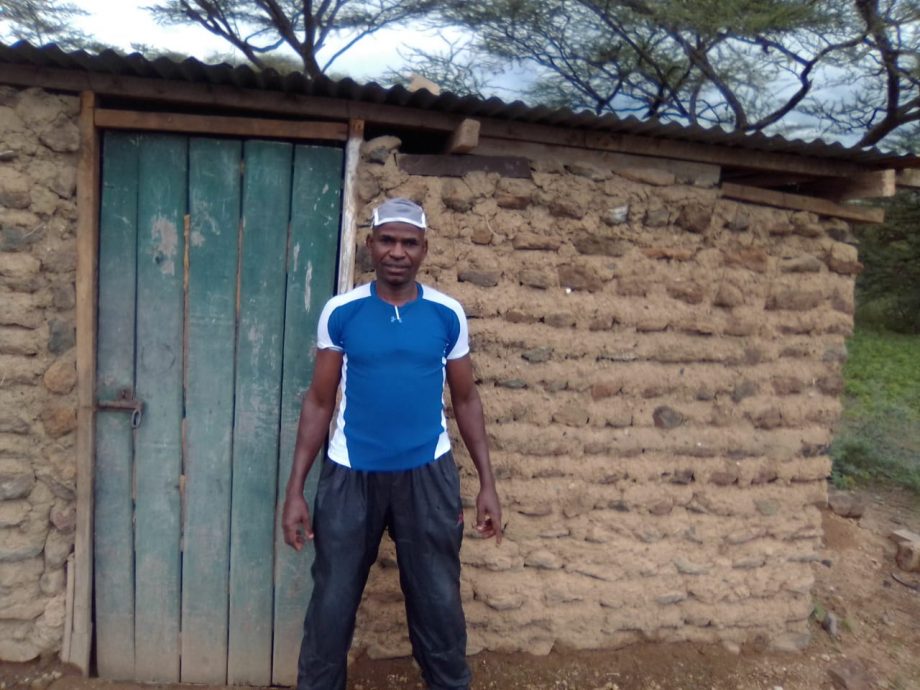
Joginder Bashir at his home in 2020. © Joginder Bashir
First message from Jogi: 2 April 2020
Jogi has worked for a tourist accommodation at Lake Baringo that already had suffered from the declining numbers of visitors. However, he and his colleagues kept the place going throughout and in a family spirit. In his first voice message from 2 April 2020, after the hotel shut down, he recounts the challenges faced due to lacking an income, and the home-schooling of his children. He also reports how the different sectors at Lake Baringo are affected by the curfew from 7pm to 5am: tourism, churches, and businesses such as fish mongering. He suggests for the government to support the inhabitants financially in order to start small subsistence farming projects and to lower tax rates.
Second message from Jogi: 1 May 2020
In his second message, one month later on 1 May 2020, Jogi tells about starting a small farming project of which he has also sent a picture. He would like to start giving online classes to children.
Daniel Kimoi, student at Kabarak University and fish trader at Lake Baringo
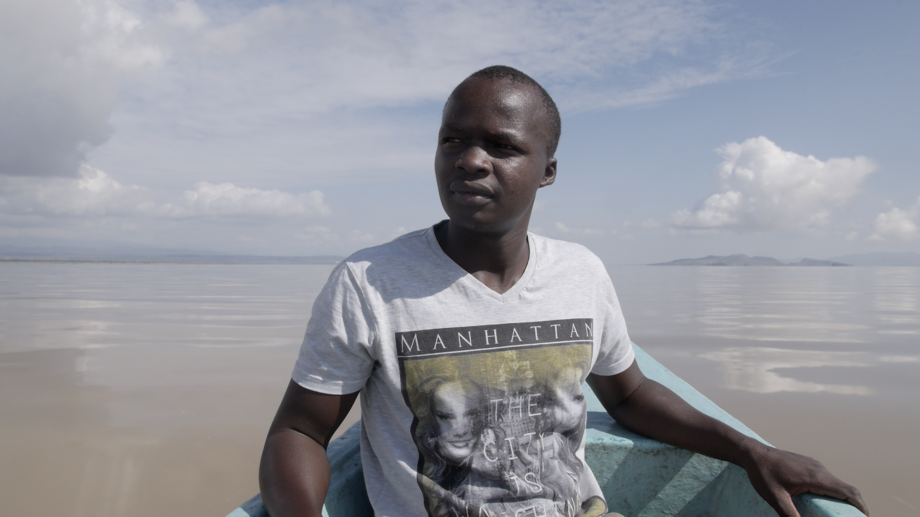
Daniel Kimoi on Lake Baringo in 2019. © Anna Lisa Ramella
First message from Daniel: 2 April 2020
Daniel’s mother is the owner of one of the biggest fish monger businesses at Kampi Ya Samaki, Lake Baringo. While he studies education science at Kabarak University close to Nakuru, he wishes to pursue a career in tourism management. In his free time he supports the family business by collecting fish from the fishermen across the lake.
In his first message, he is telling us about the curfew and the arrests in which neglecting it can result. He reports that the businesses are operating – except for the local hotels, bars and open-air markets such as the fish market, due to the overcrowding and high age of most fish mongers.
Second message from Daniel: 2 May 2020
In his second message a month later, he recounts how the crisis has affected him psychologically and financially. The closing of his university, which he was supposed to graduate from this year, has led to the cancelation of his final exams indefinitely. Financially, he sustains himself through the family business by fish trade and boat trips. Now, as the government has closed the fish trade, he depends on the money from his parents, who however are equally affected by the closing.
Jack Amolo, fisherman at Lake Baringo
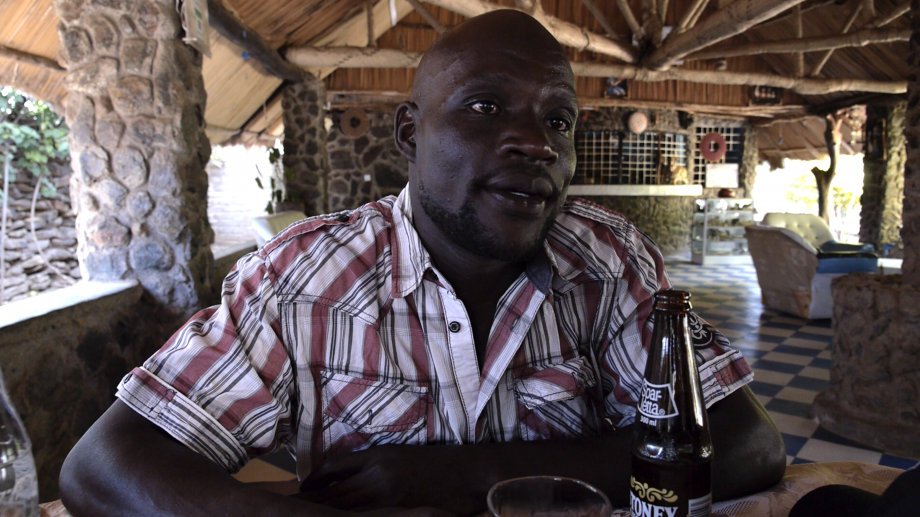
Jack Amolo in Kampi Ya Samaki in 2019. © Anna Lisa Ramella
First message from Jack: 2 April 2020
Jack is a migrant fisherman from Kisumu, who came to Lake Baringo for fishing. He lives in a small fishermen’s settlement in Sokotei across the lake from Kampi Ya Samaki, and sells his haul from the boat to fish mongers like Daniel Kimoi, who collect the fish.In his first message, he is recounting how the closing of businesses by the government has affected the population at Lake Baringo, who mainly depend on fish.
Second message from Jack: 5 May 2020
One month later, on 5 May, he reports that the small scale traders have returned to business, even though the numbers of infected and deceased persons have increased in Kenya. He himself has been going back and forth between his hometown and Baringo due to an illness of his mother. A few days before publishing this article, he added via text message that his mother has died of a stroke and he is now struggling to finance the burial.
Elisha Obonyo, flower farm worker and fisherman at Lake Naivasha
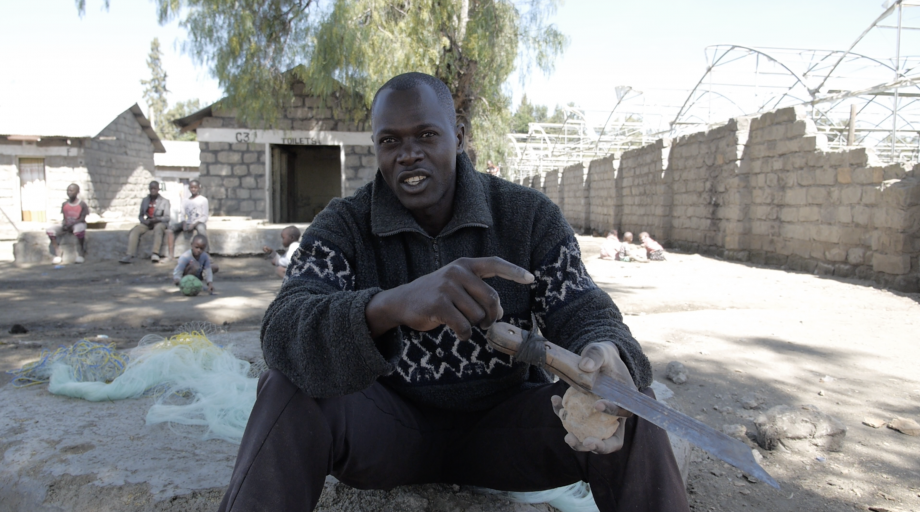
Elisha Obonyo at his settlement in Naivasha in 2020. © Anna Lisa Ramella
Message from Elisha: 7 April 2020
Elisha is a friend and colleague of our research assistant Robinson who also works in a flower farm. They usually go fishing in the lake after work each day.
He gives insight into why the measures of the government were targeting night time curfews, when apparently people are more likely to ignore the safety measures. As a flower farm worker, he gives insights on how the flower farms have taken measures to send employees on compulsory unpaid leave due to stagnant flower markets in Europe. He is also mentioning the difficulties of abiding to the safety measures such as washing hands, keeping distance and wearing a mask – as they are very expensive and hard to get.
Fearing the complete lockdown, he tells of the consequences of not being able to sell his fish due to the closing of Nairobi’s markets and the restrictions of movement.
Pamella Moncho, laid-off flower farm worker at Lake Naivasha
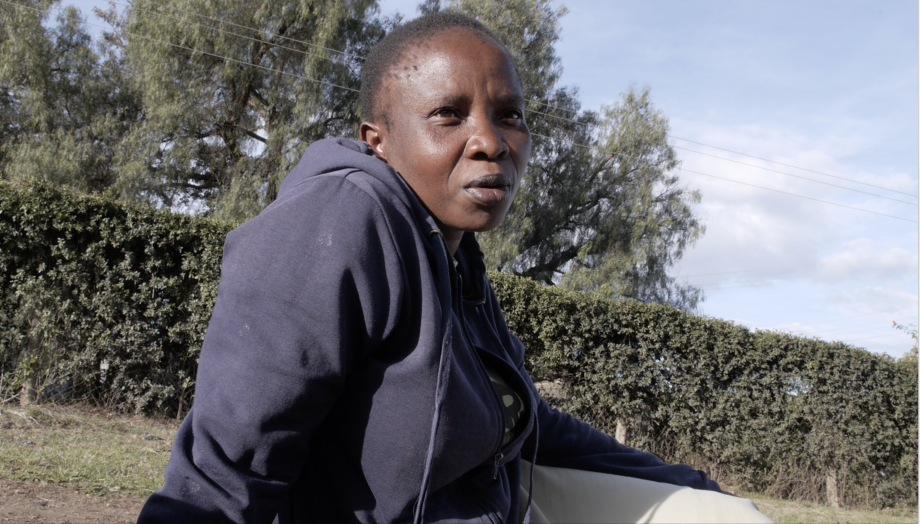
Pamella Moncho in Naivasha in 2019. © Anna Lisa Ramella
Message from Pamella: 5 April 2020
Pamella is an on-and-off flower farm worker with seasonal contracts. She has been jobless for some time and the family mainly depends on the revenues deriving from her husband’s small eatery in the settlement.
In her message, she is telling about how the pandemic has affected businesses and sent many flower farm workers into unemployment. She also says that they are fearing the spread of corona in the dense settlements, but traveling home to the village is too expensive, as transport prices (among others) have increased dramatically. She notes her praying to God in the hope that the pandemic will stop.
She also remarks that the school fees have been paid for the whole semester, even though schools are now closed, and it is not sure whether the money spent will be redeemed by finishing the school year.
Ritah Akinyi, teacher at a former company school of a collapsed flower farm at Lake Naivasha
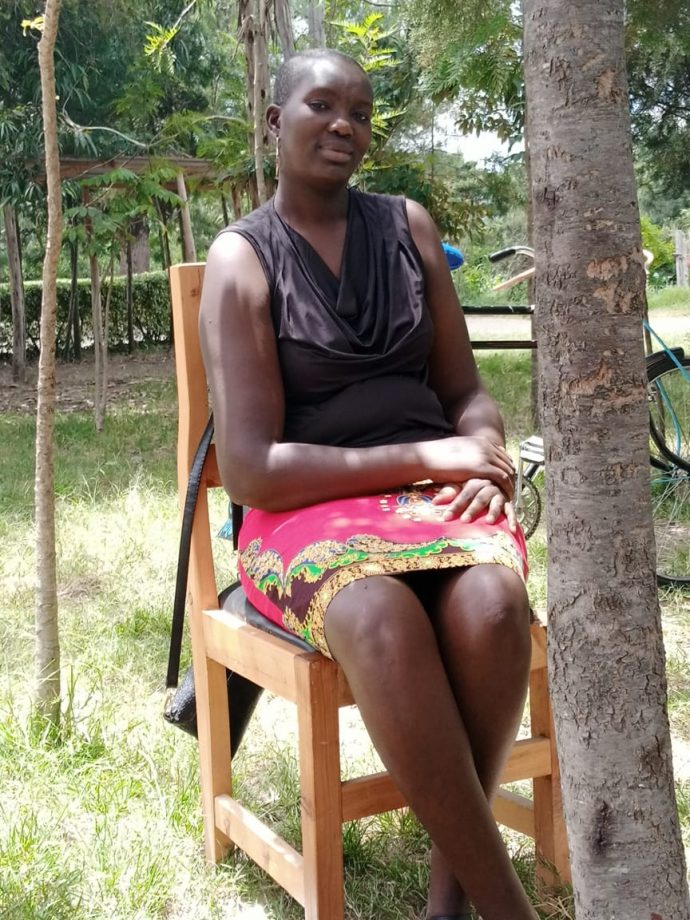
Ritah Akinyi at her school in Naivasha in 2020. © Ritah Akinyi]
Message from Ritah: 5 April 2020
Ritah is a school teacher at a primary school founded by the former owners of one of the biggest flower farms at Lake Naivasha, which later went bankrupt. Apart from the struggles the teachers are facing generally, depending on the payments from parents who are equally dependent on their short-term contracts by the flower farms, she now reports how the situation has worsened.
She talks about the effects on the whole community and the school, as she voices her worries for the pupils who depend on the utilities from the school. She also mentions deteriorated medical services and increased prices for commodities and food as well as for services such as electricity.
Robinson Ogwedhi, flower farm worker and research assistant at Lake Naivasha
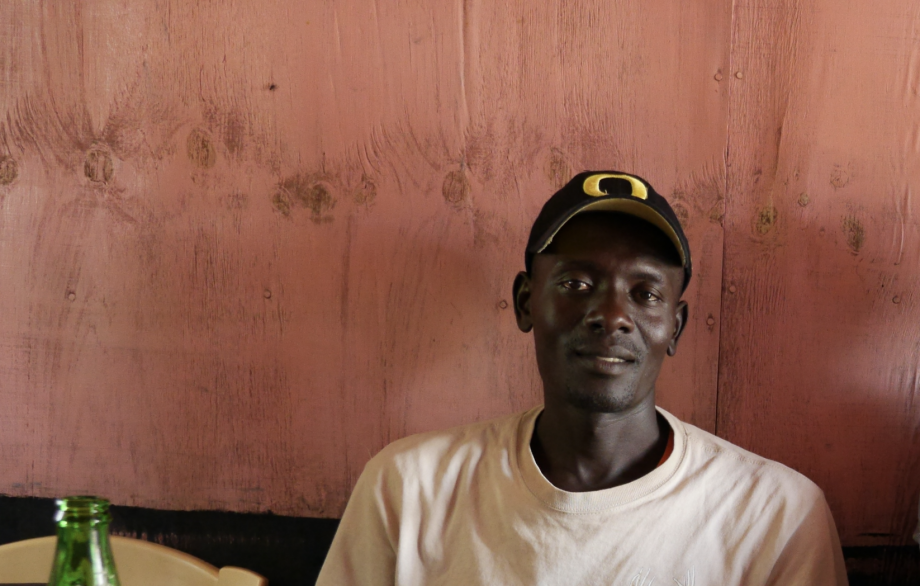
Robinson Ogwedhi at a restaurant in Naivasha in 2019. © Anna Lisa Ramella
First message from Robinson: 3 April 2020
Robinson is our research assistant and a flower farm worker on a temporary contract. He has two children who attend Ritah’s school.
In his first message sent in early April, he talks about how the corona measures are affecting the whole community as the businesses have gone low and even closed up.
Some of the flower farms have closed and sent home all workers, either laying them off or sending them into unpaid leave – he had to sign a leave form by his company which makes him stay at home for at least 30 days, and which might mean that he has lost his job. He does not have the means to travel to his rural home in order to do work there.
Second message from Robinson: 5 April 2020
In his second message sent a few days later, he explains why the companies have laid off workers, which is related to prevention requirements of keeping a distance as well as lacking orders of their products from Europe.
Third message from Robinson: 5 May 2020
About a month later, on 5 May 2020, he sent another message in which he recounts that the has been without a job for over a month now as his company never called him back to work. His only resort is to hustle to get food on the table for his children.
Additionally, the fishing activity he usually resorted to besides his work in the flower farm has become more risky because the lake level has risen due to floods. The fish is not enough to sell, but only serves to feed his children. Since the situation is the same for all his relatives, he cannot get support from them.
Florence Obonyo, sustainability manager at a flower farm at Lake Naivasha
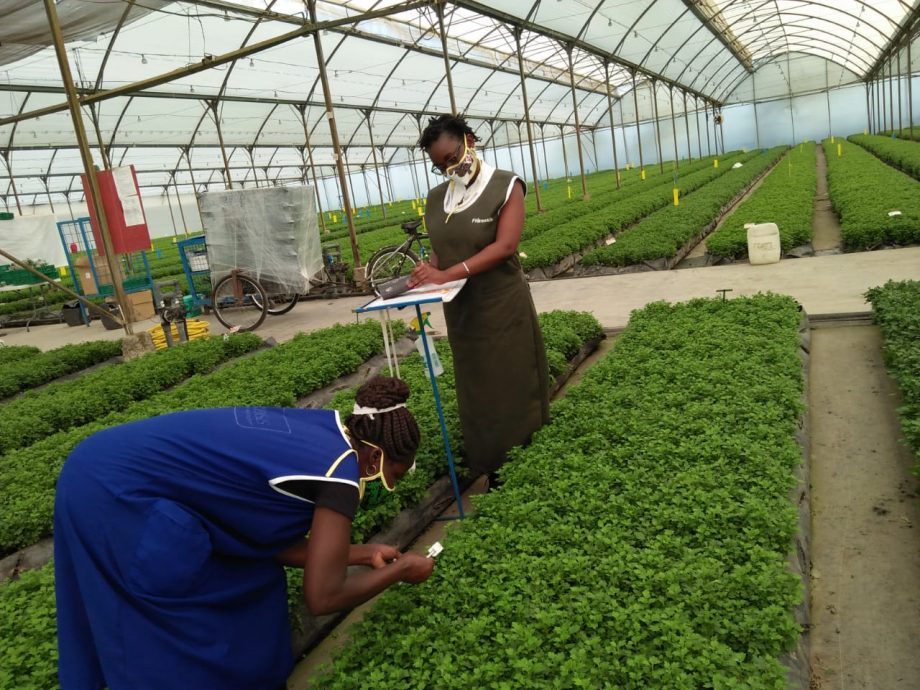
Florence Obonyo at her workplace in Naivasha in 2020. © Florence Obonyo
Message from Florence: 23 April 2020
Florence has worked as a sustainability manager at a flower farm that sells flower cuttings to the European market for about one year. In her message, she is reporting on how the crisis has affected the employees of the flower farm, who have now become the main bread winners for the family, as family members who worked for other flower farms on temporary or permanent contracts have been laid off. Closed schools pose another challenge as food costs rise with the increased family members eating at home, as well as loans for school fees which have been stalled.
Psychologically, she reports a strong notion of fear being illustrated by not reporting cases of illness to the company in fear of losing the job. Panic has been caused by media coverage reporting rising case numbers which might lead to companies closing down.
Florence also explains the measures and plans her company has taken since the outbreak of the virus, which mainly revolves around the goal to to secure the salaries of their employees and casual workers, and to provide them with safety materials.
She reports that the government has lifted income taxes for all those who earn less than 25.000 KSH (approx. 215€), meaning that most workers are relieved of tax.
Submitted on 14 May 2020, finalized 1 June 2020
Anna Lisa Ramella and Martin Zillinger are anthropologists at the University of Cologne. Martin holds a professorship in Anthropology and is Principal Investigator of the Global South Studies Center (GSSC) and the subproject “Testing Future – Cross-scalar linkages as coping strategies for socio-economic exclusion“ of the CRC “Future Rural Africa“, in which Anna Lisa works as a postdoctoral researcher. Their fieldwork takes place in the Kenyan Rift Valley, where they research with audiovisual methods the strategies of future-making among migrants from western Kenya by engaging in sectors such as fishing, agricultural labor and tourism. Contact: anna.ramella[at]uni-koeln.de and martin.zillinger[at]uni-koeln.de
#Witnessing Corona
This article was simultaneously published on the Blog Medical Anthropology / Medizinethnologie. Witnessing Corona is a joint blog series by the Blog Medical Anthropology / Medizinethnologie, Curare: Journal of Medical Anthropology, the Global South Studies Center Cologne, and boasblogs.































